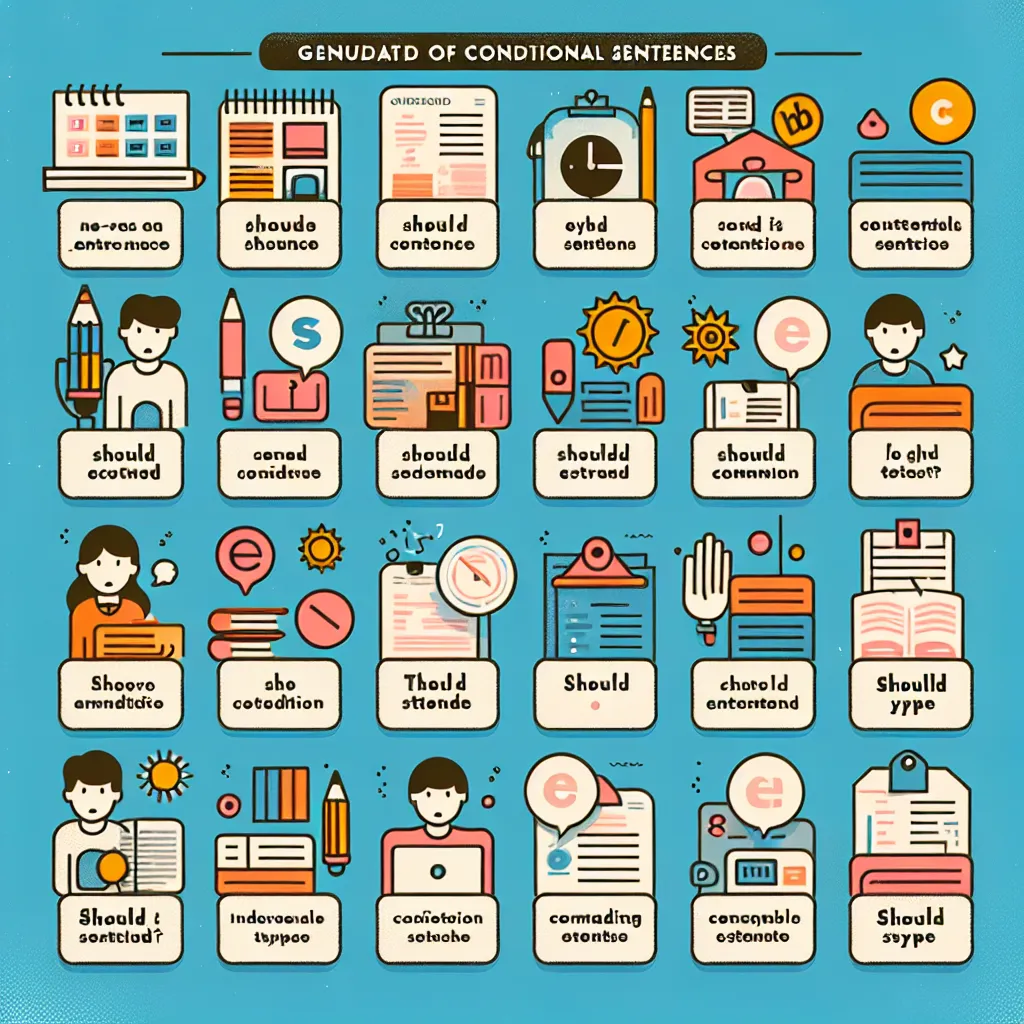Mastering the use of “should” in conditional sentences is crucial for IELTS success. This versatile modal verb appears frequently in various parts of the IELTS test, including Reading, Listening, and Writing tasks. Understanding its nuances can significantly enhance your language proficiency and help you achieve a higher band score. Let’s delve into the intricacies of using “should” in conditionals and explore how to apply this knowledge effectively in your IELTS preparation.
The Significance of “Should” in Conditional Sentences
“Should” in conditional sentences expresses advice, recommendation, or an ideal situation. It’s commonly used in the main clause of first conditional sentences to suggest a course of action based on a possible future condition. This structure is particularly useful in IELTS Writing Task 2 and Speaking Part 3, where you’re often required to discuss hypothetical situations or offer solutions to problems.

Formula and Grammatical Structure
The basic structure for using “should” in conditional sentences is:
If + present simple, … should + base verb
It’s important to note that “should” remains in its base form regardless of the subject. Let’s examine some examples:
- “If it rains tomorrow, you should take an umbrella.”
- “If the government raises taxes, companies should consider reducing their expenses.”
- “If you want to improve your IELTS score, you should practice more writing tasks.”
- “If climate change continues at this rate, world leaders should implement stricter environmental policies.”
- “If you feel unwell before the IELTS test, you should inform the test center immediately.”
In each of these examples, “should” follows the main clause beginning with “if” and is followed by the base form of the verb. This structure allows you to express recommendations or ideal actions based on potential future scenarios.
Applying “Should” in Conditional Sentences Across IELTS Tasks
IELTS Writing Task 2
In Writing Task 2, using “should” in conditional sentences can help you present solutions or recommendations effectively. For instance:
“If governments want to reduce traffic congestion in cities, they should invest in better public transportation systems. This could include expanding subway networks, introducing more bus lanes, and promoting cycling infrastructure.”
Here, the use of “should” allows you to suggest a course of action based on a hypothetical condition, demonstrating your ability to analyze problems and propose solutions – a key skill for achieving a high band score in Task 2.
IELTS Speaking Part 3
In the Speaking test, particularly in Part 3 where you discuss more abstract topics, using “should” in conditionals can showcase your ability to speculate and offer opinions on complex issues:
“If climate change continues to worsen, I think governments should implement more stringent regulations on industrial emissions. This could involve setting stricter carbon quotas or incentivizing the use of renewable energy sources.”
This response demonstrates your capacity to use complex grammatical structures while discussing a hypothetical situation, which is essential for scoring well in the Speaking test.
Advanced Usage for Higher Band Scores
To aim for higher band scores (7 and above), consider these more sophisticated applications of “should” in conditionals:
-
Mixed conditionals: “If the government had invested more in education, the workforce should be more skilled now.”
-
Inverted conditionals: “Should the economy improve, we can expect a decrease in unemployment rates.”
-
Using “should” for probability: “If my calculations are correct, the project should be completed by next month.”
-
Combining with other modals: “If the situation deteriorates, the authorities should be able to implement emergency measures quickly.”
-
Using in passive structures: “If the proposal is accepted, new regulations should be implemented immediately.”
These advanced structures demonstrate a high level of grammatical control and versatility, which are crucial for achieving top band scores in IELTS.
Common Mistakes to Avoid
When using “should” in conditional sentences, be wary of these common errors:
-
Using “will” instead of “should” for recommendations:
Incorrect: “If you want to improve your English, you will practice every day.”
Correct: “If you want to improve your English, you should practice every day.” -
Mixing up tenses:
Incorrect: “If it will rain tomorrow, you should take an umbrella.”
Correct: “If it rains tomorrow, you should take an umbrella.” -
Using “should” in the if-clause:
Incorrect: “If you should feel unwell, let the examiner know.”
Correct: “If you feel unwell, you should let the examiner know.” -
Forgetting to use the base form after “should”:
Incorrect: “If the test is difficult, candidates should to remain calm.”
Correct: “If the test is difficult, candidates should remain calm.” -
Overusing “should” in academic writing:
While “should” is useful, overuse can make your writing sound too subjective. Balance it with other structures and more objective language in formal essays.
Conclusion
Mastering the use of “should” in conditional sentences is a valuable skill for IELTS success. It allows you to express recommendations, discuss hypothetical situations, and demonstrate a high level of grammatical control. Practice incorporating these structures into your writing and speaking to enhance your overall language proficiency. Remember to vary your sentence structures and vocabulary to showcase the full range of your English skills in the IELTS test.
To further improve, try creating your own sentences using “should” in conditionals, focusing on topics commonly found in IELTS, such as education, technology, environment, and social issues. This practice will not only enhance your grammar but also prepare you for the content you’re likely to encounter in the actual test.